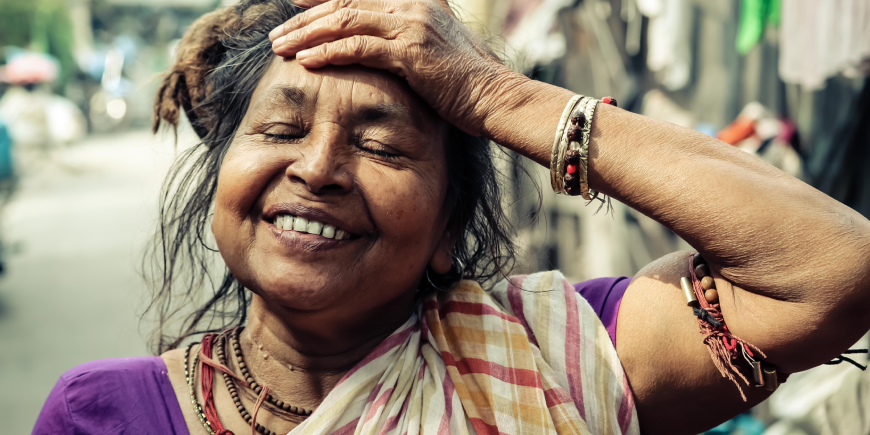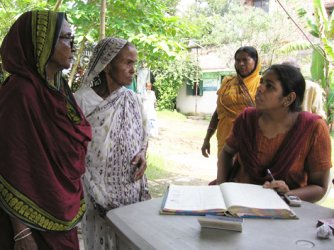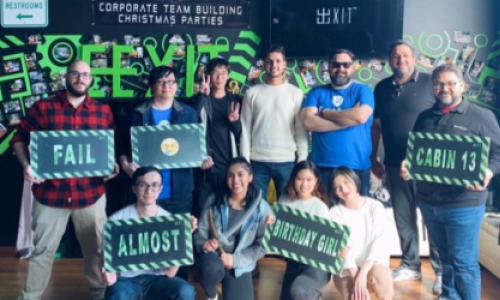
In fall 2008, Kali Penney went on a three month journey as a volunteer Co-op student working with Sociol Legal Aid and Research Training Centre (SLARTC) in Kolkata, India. She worked along side SLARTC, and other organizations in their geriatric and adolescent health, human trafficking and rights and HIV/AIDS fields.
Somehow, a month has gone by since I arrived in Kolkata. My first week was mainly filled with errands: changing traveler's cheques, getting my cell phone up and running, buying groceries, etc... Simple things like getting a cell phone seem to always take longer than expected in India, and once I was settled in I was getting anxious to start working. This proved to be more difficult than I had anticipated.
My Co-op placement in Kolkata was planned a little bit differently from most. For one thing, I am here on a volunteer basis. For another, my official Co-op supervisor in India, Smarita, is not actually someone I will be working for, but a woman who has done a lot of NGO work and has a lot of contacts in Kolkata. The plan, as I understood it, was that she would have work lined up for me when I arrived, likely with 2 or 3 different NGOs, each of whom I would work with for approximately a month. First lesson learned about working in India: things never seem to go as planned.

I had hoped to get the chance to do some work at Destiny Reflection, Smarita's company that held the Puja (seePart 1 of this series), as I had heard a lot about this project fromDr. Rochelle Tucker, one of my health sciences professors at SFU. Her stories of Kolkata and of working with the girls at Destiny are what inspired me to pursue a Co-op term here. However, two volunteers had arrived from New Zealand a few weeks before me and were already helping out at Destiny and there was no room for another volunteer at this point. I talked to Smarita and she said we would begin meeting some of the NGOs that said whey would take on a volunteer.
We set up a meeting with the director of Mercy Hospital, a local hospital, and when we went to meet with him things looked promising. He said they could probably use me and to e-mail them the next day to set it up. After e-mailing them I received a response - yes they would like me to work for them, was I available in March 2009?
My next meeting was with a group called Sruti disAbility Rights Centre. The director, a woman named Shampa, was very nice and said that they could definitely use some help. This too sounded promising. She gave me a copy of a recent study they had done, said she would e-mail me some website links to check out and set up another meeting for a few days later. I read the study, and though I never got an e-mail from Shampa I researched disability issues in India on my own and tried to learn as much as possible about the subject. When we met again it was with several other members of Sruti and we discussed what they had been working on. I found it interesting to hear about their work but was having difficulty figuring out where I would fit in. I think they had difficulty with this as well, and the plan for me was left up in the air, with Shampa leaving the following morning for Delhi. A few unreturned e-mails and I began to lose hope that I would work here.
At this point I began to stress out. I had been in India almost 2 weeks and had yet to do much real work of any kind. I imagined failing my Co-op term and having to stay in Kolkata with nothing to do for the next three months.
Not being ones to give up, Smarita and I arranged a meeting the next day with Manabendra Mandal, the director of an NGO called Socio Legal Aid Research & Training Centre (SLARTC). He was very nice, told me they have interns come in often, and asked me if I could start on Monday. Yes! I relaxed that weekend with the calming knowledge that I would be working on Monday.
Monday morning I arrived at the office to find it unnaturally quiet. Mr.Mandal had forgotten to tell me that it was a holiday. Second lesson learned about working in India: the month of October is perhaps not the best month in which to begin a work term. There are so many holidays in October, from Gandhi's birthday to Ramadan, multiple Pujas and Diwali, that it is difficult to log many hours since offices are closed a good part of the month.
Luckily for me, my work with SLARTC involves independent research in the area of adolescent health. I've thanked my lucky stars several times for having my first project here be such a flexible one; I've been able to be productive at home and at internet cafes throughout the month. Not that I haven't had time to enjoy the festivities...while October may not be the best month to be looking for work in Kolkata, it is definitely a great month to experience Bengali culture and to get out and see the city celebrating.
Stay tuned for future entries in Kali’s “Ode to the City of Joy” series.
Beyond the Blog
- Check out the blog series, SFU Health Sciences Takes India! for more incredible student experiences.


















